FOSSIL FUEL
Farmers’ alarm over Free State drilling plans — despite ‘no fracking’ pledge by Rhino oil and gas company
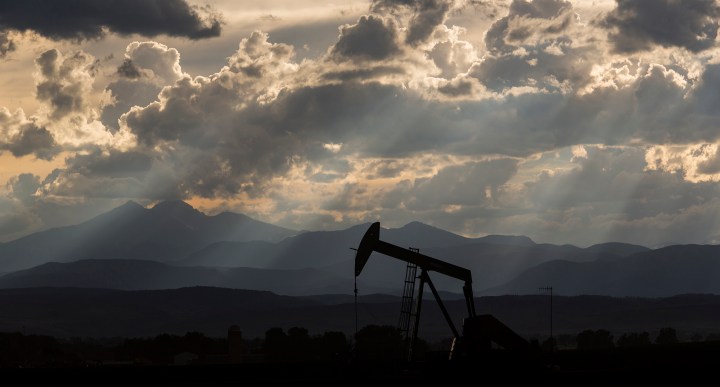
Agri SA said the farming federation would monitor the Rhino gas exploration process with the ‘utmost attention’ and intervene if necessary.
Rhino Resources, a subsidiary company of European and American fossil fuel investors, has announced plans to dig dozens of gas exploration wells in the farmlands of the Free State.
The company is asking Minister Gwede Mantashe’s Mineral Resources and Energy Department for permission to drill roughly 50 exploration wells over a swathe of land currently occupied by more than 2,500 farmers in the northern section of the Free State.
Rhino directors have signed a written assurance that they have “no ambition” to pursue fracking (water-intensive underground rock-fracturing) in the exploration process, but the country’s largest federation of farming organisations nevertheless remains concerned that Rhino drilling plan could set in motion “a sequence of events that may ultimately lead to a full-blown shale gas and fracking industry in South Africa”.
Janse Rabie, policy executive officer and head of natural resources at Agri SA, said the federation would monitor the Rhino gas exploration process with the “utmost attention” and intervene immediately should the company renege on public commitments.
Extreme risk
Agri SA, which recently submitted formal comments on new draft regulations to govern fracking, has also called on the government to reject hydraulic fracturing as an extreme risk to the country’s water, environment and food security.
Little is known about Rhino’s investors and shareholders as its website has been moribund for months, other than a note that it is “under construction”.
The original parent company, Rhino Resources Ltd was founded by Patrick James Mulligan, a Dallas-based lawyer and member of the Texas Oil and Gas Association. A keen hunter and African safari fan, Mulligan died in 2019 and it remains unclear which investors took over after his death.

Rhino Resources director Travis Smithard (Image: Linkedin)
The only two visible directors and permanent employees appear to be Cape Town-based exploration geoscientist Travis Smithard and Cornelius ‘Cor’ Timmermans, a London-based former banker and analyst who founded Roodhals Capital in the Netherlands (now known as Lobourg Limited).
According to Smithard, the company’s website remains inactive because Rhino is still restructuring and updating the content to align with new objectives.
“Please note that in late 2021, Rhino was recapitalised by some private European and American investors. As a result of the restructuring, the new Rhino management have now a strong focus on all aspects of ESG (Environmental, Social, and Governance principles).”
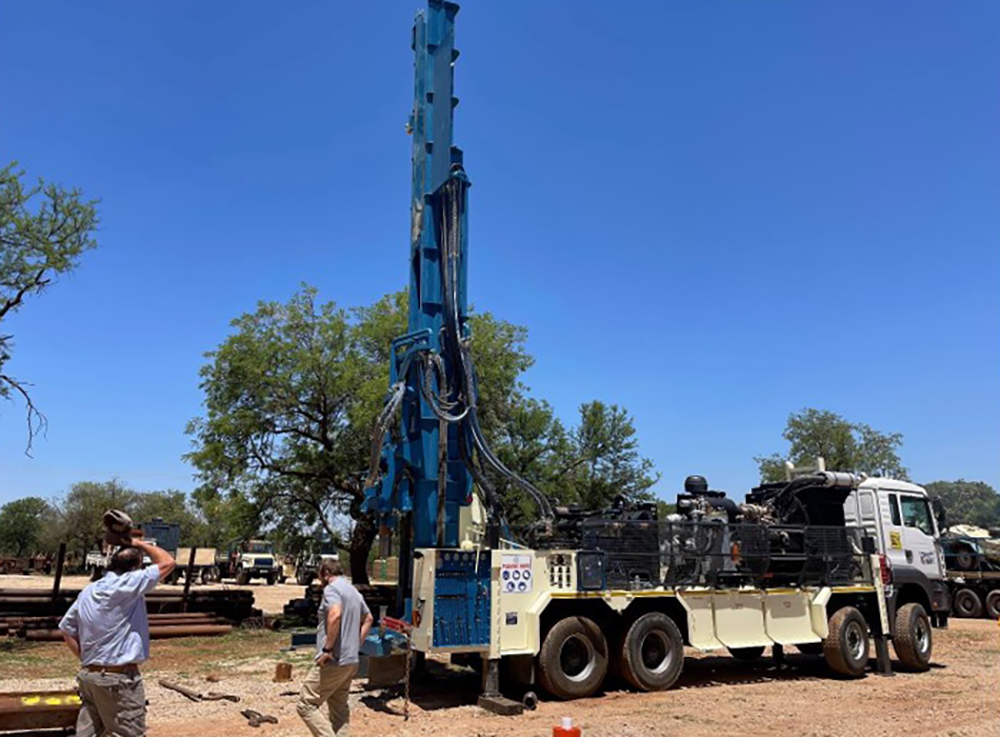
One of the truck-based drilling rigs Rhino hopes to deploy to the Free State in search of underground gas. (Photo: SLR scoping report)
A noteworthy snippet on Smithard’s Linkedin profile describes his subsidiary role as attending fossil fuel conferences such as Africa Oil Week “to engage other operators seeking farm-in opportunities”.
A farm-in is an oil industry term for deals where a larger company, not currently a licensee, can acquire an interest from one of the existing licensees. It allows a licensee to offset the costs associated with drilling, developing, or removing fossil fuels from the land.
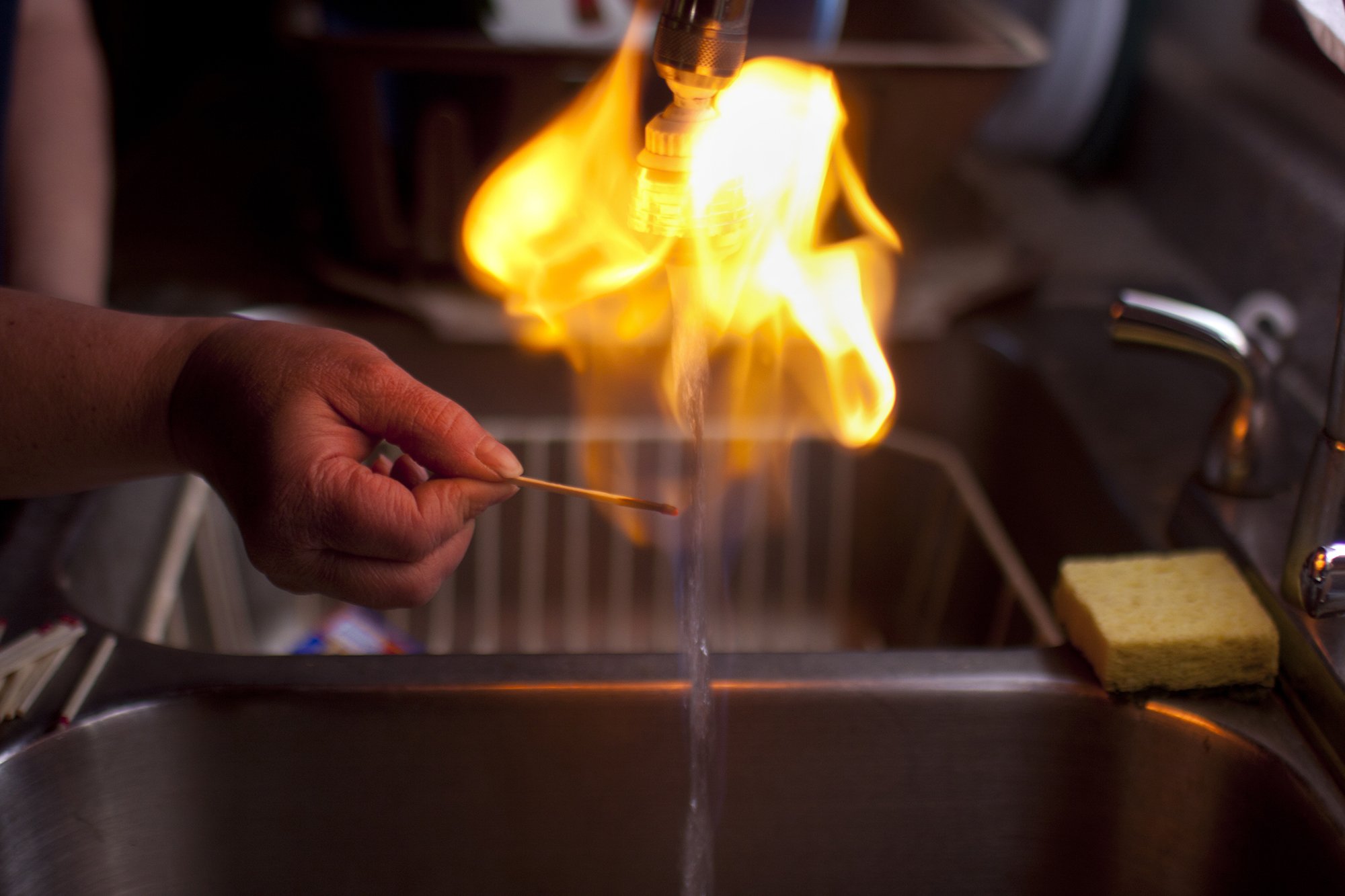
Sherrie Vargson ignites the water coming out of her kitchen tap in Bradford County, Pennsylvania in 2012. Methane gas polluted the well beneath her home in the Marcellus Shale region, making the water flammable. (Photo: Les Stone / Greenpeace)
Formal application
Last week, Rhino’s environmental and public engagement consultants (SLR Consulting), announced that the company was lodging a formal application to extend its existing oil and gas exploration rights for another two years for two areas in the Free State known as ER 294 and ER 318.
They said Rhino had already sourced geological core samples from the Council for Geoscience and conducted airborne geophysical tests and this exploration and analysis work “has furthered confidence regarding the presence of natural gases” from the two sites.
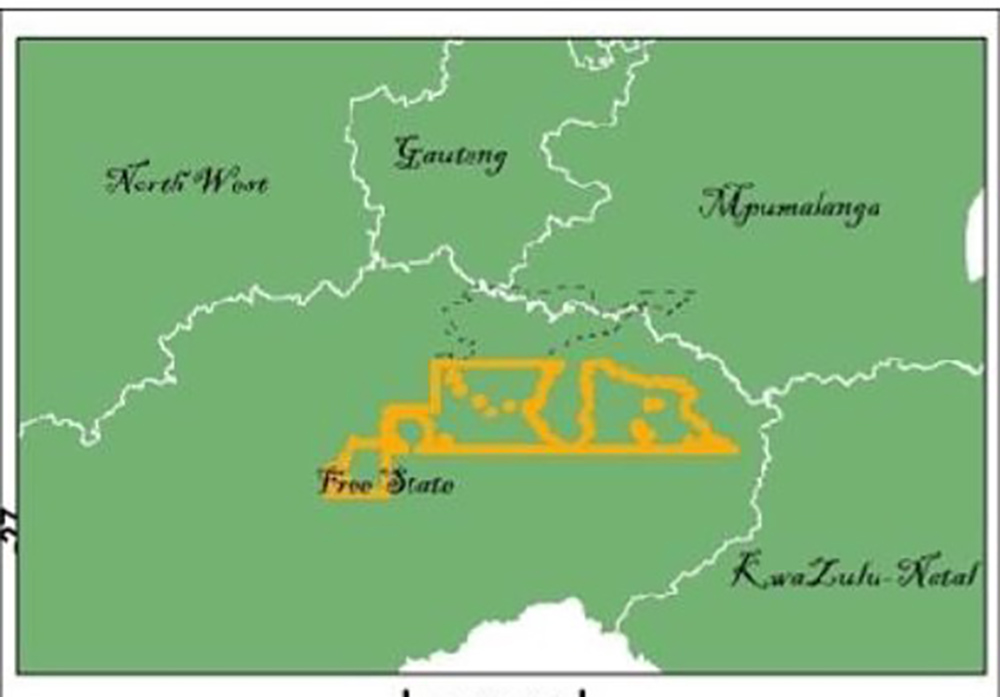
ER 294 rough locator map. (Image: Supplied)
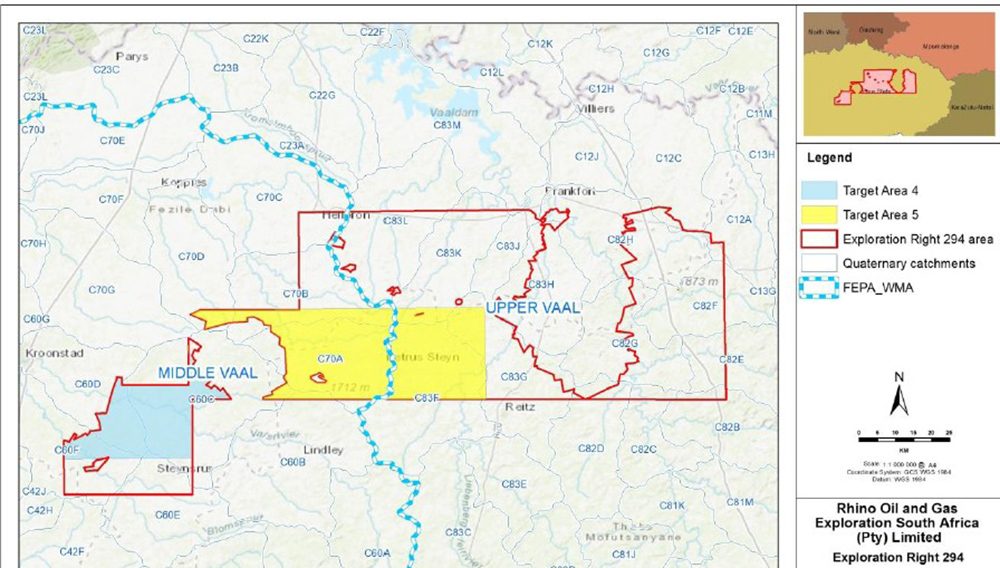
ER 294 target areas. (Image: Supplied)
The first exploration block (ER 294) contains two “target areas” around the town of Petrus Steyn covering nearly 1,800km2 and over 1,300 farms or privately-owned properties.
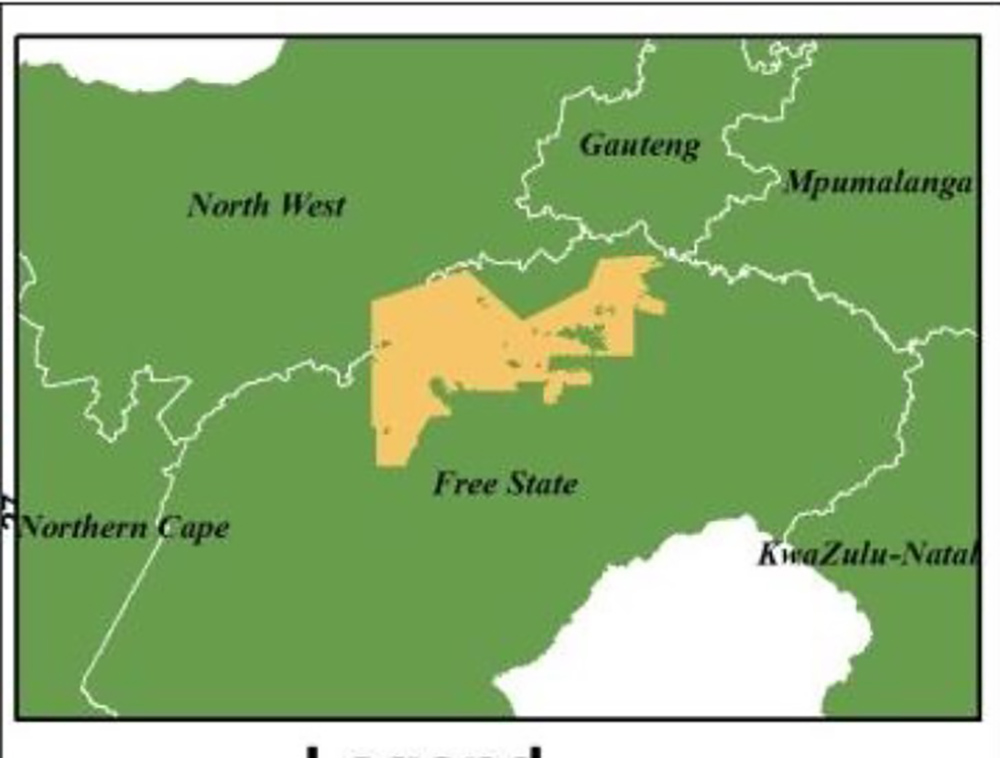
ER 318 rough locator map. (Image: Supplied)
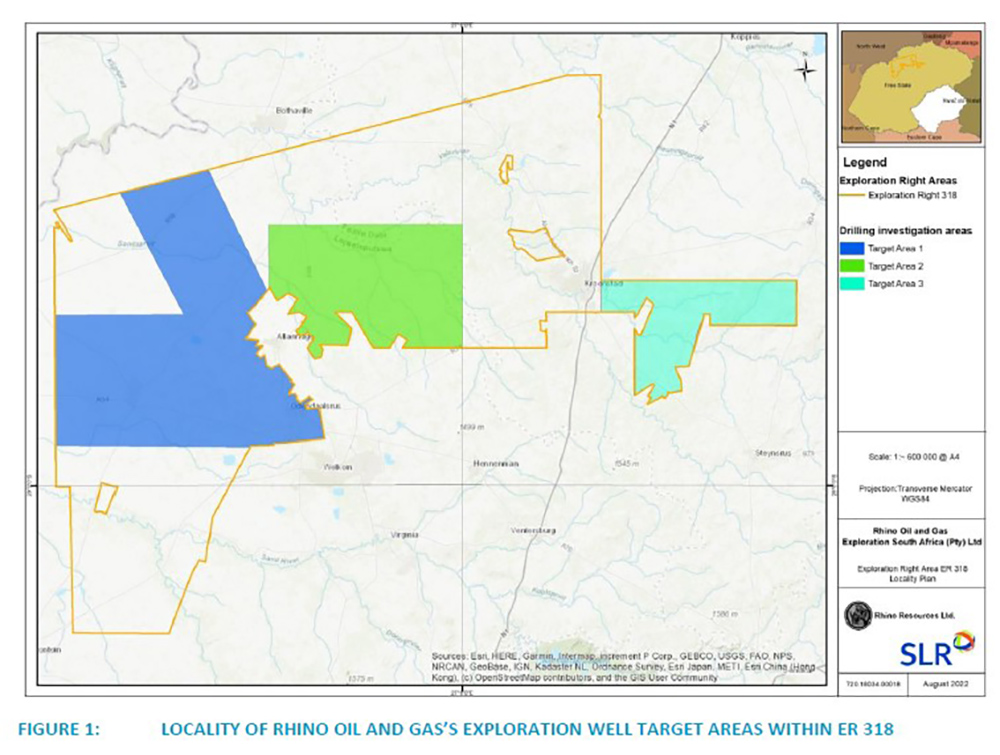
ER 318 target areas. (Image: Supplied)
The second block (ER 318) contains three target areas near the towns of Welkom, Allanridge, Steynsrus and Kroonstad covering nearly 788km2 of land with 1,235 properties.
Visit Daily Maverick’s home page for more news, analysis and investigations
Though the public has just 30 days to comment on the initial proposals and public consultation process, SLR acknowledges that it is still in the process of trying to contact certain landowners whose contact information was not known.
Rhino planned to drill at least 10 exploration wells in both exploration areas at some point next year, with possibly 40 wells in ER 294 if commercially viable reserves of petroleum, helium or hydrogen were to be found in the first wells.
In a scoping report for the project, SLR says: “While South Africa continues to explore the use of hydraulic fracturing through the development of policy and specific regulations, Rhino Oil and Gas has publicly confirmed that their corporate strategy will not be exploring for shale oil or gas and therefore will not use hydraulic fracturing as part of their planned exploration or potential future production”.
The report also contains a copy of a letter to Vrystaat Landbou president Francois Wilken in which Smithard and Timmermans declare that they have “no ambition or interest in undertaking shale gas exploration and/or the associated use of hydraulic fracture simulation as a completion methodology to extract resources”.

Rhino Holdings SCSp director Cor Timmermans (Image: Linkedin)
Timmermans describes himself in the letter as a director of Rhino Holdings SCSp, which appears to be a special limited partnership governed by Luxembourg Company Law.
Unclear assurance
Smithard did not respond directly to a query by Our Burning Planet on what faith the public could place in the “no fracking” assurance unless it was a legally binding condition of the exploration contract and subsequent production rights (applicable to Rhino and any third party company that Rhino might choose to sell its exploration/production drilling rights to at a future time).
Smithard simply repeated his statement that Rhino had no interest in shale gas or fracking.
“In addition, there is no regulatory authority which allows for fracking in South Africa and from a technical perspective, there is no geological merit to undertake any fracking of shales across any parts of Rhino’s acreage.
“Rhino South Africa strongly believe that our activities must be aligned with the interests of the communities in which we operate … Accordingly, we have held numerous meetings with farming unions and individual farmers across the Free State over the past year, most of whom are content once they understand what we are trying to achieve,” he asserted.
Scepticism
But Rabie appeared distinctly sceptical about accepting Rhino’s assurances at face value. In response to our queries, Rabie said: “Agri SA’s mandated position concerning oil and gas production by way of fracking is that, in light of significant concerns and the absence of sufficient assurances with respect to the availability of water to be able to support hydraulic fracturing, as well as concerns with respect to pollution arising from this method of exploration and production of shale gas, Agri SA cannot support government or any development proponent’s attempts to do so.
“We have engaged with Rhino Resources and they confirmed their commitment to not frack. If they were to change their position (which we know might happen at a later stage) they would have to re-apply for environmental authorisation (in terms of the National Environmental Management Act) and water use licensing (in terms of the National Water Act), which would require further public consultation. This would again afford interested and affected parties (such as ourselves) the opportunity to halt fracking by way of appeal and possibly high court review proceedings against any authorisations.
“We are concerned that Rhino’s activities will set in motion a sequence of events that may ultimately lead to a full-blown shale gas and fracking industry in South Africa, but we have to abide with the proposals and authorisation process requirements as presented to us now. We will be monitoring the Rhino process with the utmost attention and will intervene as soon as possible, should they not be true to their commitment.”
Gernie Botha, the chief executive of Free State Agriculture, said he endorsed Rabie’s statement.
Exploration wells
According to the SLR scoping report, the exploration wells would be drilled to depths of up to 1km below the surface and it was considered that there would be “very little opportunity for cross-connection between aquifers and changes in water availability” around the well sites south of the Vaal River.
The report acknowledges that the target areas are home to significant commercial agriculture, ranging from maize and other crops to beef cattle, sheep, horticulture, dairy farming, game farming, aquaculture and fruit.
In addition to the two exploration blocks in the northern Free State, Rhino also has a third exploration area (ER 350) covering areas of the eastern Free State and northern parts of KwaZulu-Natal.
Earlier this year, Rhino abandoned a fourth exploration area (ER 346) in KZN and the Free State that covered about 6,060 farms in an area of about a million hectares.
Interested groups have until 9 November to comment on the scoping report and can contact either [email protected] or [email protected] for more information. DM/OBP







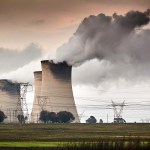


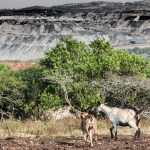










All that we know of the recent history of ‘fracking’, especially in the USA and Australia (fully documented in many hundreds of academic/scientific papers, reports and commentaries) tells us that this process should not under any circumstances be allowed to get even the smallest foothold in South Africa. The documented harms are many and various: for example, massive increase in truck traffic, bringing noise, pollution, road destruction and community disruption; release of exceptionally carbon-‘rich’ methane; pollution of groundwater through a variety of chemicals (the details of which are often ‘confidential’), destruction of tourism (especially ecotourism) jobs, etc. Plus the broader policy boondoggle suggesting that this is a less damaging ‘transition’ from fossil fuels to renewables. Total PR piffle. Also, follow the money, as usual – cui bono, who would stand to benefit?
I trust that there will be an EIA conducted by an independent authority PRIOR to the conduct of any exploration/drilling and that the applicant will be responsible for reversing any subterranean pollution of scarce water resources
They must all think we are brain dead. Why would they go to expense of drilling these [very expensive ] Exploratory wells if they have no intention of developing them at a later stage? If they find the gas then the possibility of developing an oil from gas field in the areas as they find it.
The point is do NOT give them anu chance to drill there. Dave Hill – Hillson Drilling Pty Ltd KZN